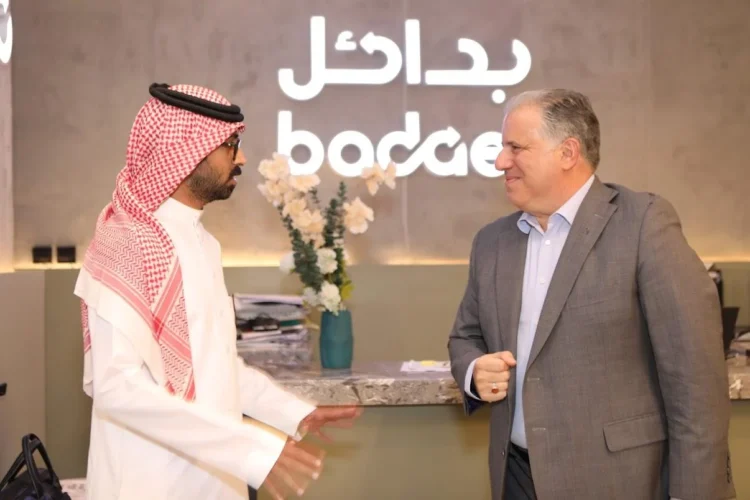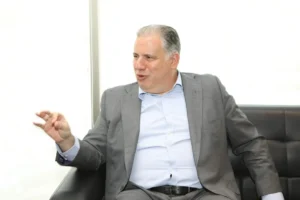Publisher: Maaal International Media Company
License: 465734
In an exclusive interview with the CEO of Badael (a PIF Company): “DZRT has helped over 500,000 individuals quit smoking. We are now preparing to open our first manufacturing facility in Riyadh by 2026”
“Our mission is to ‘lose’ our customers… because our success is measured by the number of people who quit.” This is the guiding principle behind Badael’s strategy to reduce the number of smokers in Saudi Arabia and the broader region.
Badael has confirmed that it has successfully helped over 500,000 people quit smoking with the aid of its products. Theyaim to reach 1 million switchers by 2028.
In an exclusive conversation with Ma’al, Tolga Sezer, CEO of Badael, a Public Investment Fund (PIF) company, outlines the company’s strategy for reducing tobacco-related harm in Saudi Arabia through the TNFS initiative, localizing production, and expanding domestic partnerships. He also shares Badael’s vision of positioning the Kingdom as a regional hub for smoking cessation solutions, emphasizing that true success lies in the number of people who quit, not in the number of products sold.
اقرأ المزيد
What is the “TNFS” initiative recently launched by Badael?
TNFS is a national initiative designed to empower smokers to take the first step toward quitting. It brings together science, public awareness, and behavioural support. The initiative reflects our national commitment to achieving Saudi Vision 2030 targets, specifically under the Quality of Life Program. Our goal is to shift the conversation on tobacco control from one of shame and fear to one of support and empowerment.
Is Badael a commercial company or a social-impact organization?
We are a commercial company with a clear social mission. Profitability ensures our sustainability, but our overarching performance metric is: how many people have quit smoking using our solutions.
We aspire to make Saudi Arabia a regional model for reducing smoking prevalence, and Badael is a key enabler in achieving that vision. We fully understand that our role isn’t just to transition smokers to lower-risk alternatives, but to help them eventually quit all forms of nicotine use. In practical terms, that means we “lose” our customers over time, and we see that as the ultimate success of our mission.
At the same time, we continue to provide our products, recognizing that the journey to quit is long and complex, and the number of smokers remains high.
This makes harm-reduction solutions a national and public health necessity.
What about industrial expansion? Is your production fully localized?
Yes, we operate a manufacturing facility in Jeddah, which forms the cornerstone of our plan to localize the production of tobacco alternatives in the Kingdom. We are currently expanding production lines and will open a new facility in Riyadh before the end of 2026. We are also exploring the development of additional facilities in other cities, which will contribute to job creation, reduce import dependency, and enhance export capacity.
Have you already begun expanding beyond Saudi Arabia?
We are considering exporting to neighbouring countries in the future and are gradually expanding our distribution network. Our vision is for Saudi Arabia to become a regional hub for tobacco harm reduction solutions. Our responsibility does not end at the local market — we see the regional dissemination of these innovations as part of our broader mission.
How much progress have you made toward your goals so far?
We’ve already achieved half of our strategic target: more than 500,000 people have quit smoking with the help of our harm-reduction solution. Our stated goal is to reach one million quitters by 2028 — but at our current rate of progress, we are optimistic that we may meet that target ahead of schedule.
What role do local partnerships play in your strategy?
Partnerships are a cornerstone of our strategy. We collaborate with Saudi universities, health associations, and national laboratories. The TNFS initiative itself was born out of broad institutional collaboration with multiple local entities. We are not just selling a product — we are building a supportive societal ecosystem for quitting smoking.
Are there published studies or research supporting the effectiveness of your products?
Absolutely. Our products undergo independent testing, and we adhere to rigorous scientific methodologies in collaboration with both international and local institutions. We are also preparing to publish the first Saudi report on the health and social impact of harm reduction products in the second half of 2025.
What is the scale of tobacco spending in Saudi Arabia, and what is the smoking rate?
We believe the Kingdom can become the first country in the region to reduce smoking prevalence to below 9% by 2030. We will continue to invest in research, local production, and institutional partnerships to help achieve this goal.
Our vision is clear:
We don’t measure success by the number of customers, but by the number of people who have quit.









